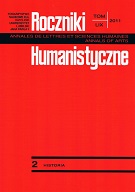Ku "jednej nieróżnej Rzeczypospolitej". Król Zygmunt August wobec idei unii polsko-litewskiej
Towards "One Not-Different Republic" King Augustus' Attitude to the Idea of the Polish-Lithuanian Union
Author(s): Agnieszka Januszek-SieradzkaSubject(s): History
Published by: Towarzystwo Naukowe KUL & Katolicki Uniwersytet Lubelski Jana Pawła II
Keywords: Polish-Lithuanian Union; Union of Lublin (1569); Sigismund II Augustus (1520-1572); the Radziwiłłs; correspondence
Summary/Abstract: The issue of the Polish-Lithuanian Union that became one of the main executionist postulates put forward by the nobility at the sessions of the Sejm from the beginning of King Sigismund II Augustus’ reign in Poland (1548-1572); it was also one of the main subjects of the monarch’s correspondence with his most important Lithuanian political partners – Mikołaj Radziwiłł “Rudy” (the Red) (about 1515-1584) and Mikołaj Radziwiłł “Czarny” (the Black) (1515-1565). In the King’s letters it is easy to observe the tactic that for nearly 20 years allowed to efficiently stop the plan of forming a Polish-Lithuanian real union that threatened the dynastic interests of the Jagiellons – a prohibition of pro-union propaganda and forming an anti-union Lithuanian party around the Radziwiłłs, obstruction, apparent concessions, winning deputies and senators against other ones, skilful temporization. Letters unambiguously show that the change in the attitude towards the question of the Union that took place at the beginning of the 1560s was for Sigismund II Augustus a derivative of the accepted solution to the issue of Livonia; the King took the position that it is only by way of forming a union of Poland and Lithuania that military security and territorial integrity of the Grand Duchy of Lithuania can be ensured. However, passing from a radically anti-union position to one of its main advocate and animator Sigismund Augustus did not change his basic postulate, namely, that Poland and Lithuania should remain separate countries and the union between them should be based on the principle of equality of both partners. It was exactly the last of the Jagiellons who decided about federation as the form of the union of the Crown (Poland) and Lithuania.
Journal: Roczniki Humanistyczne
- Issue Year: 59/2011
- Issue No: 02
- Page Range: 81-98
- Page Count: 18
- Language: Polish

